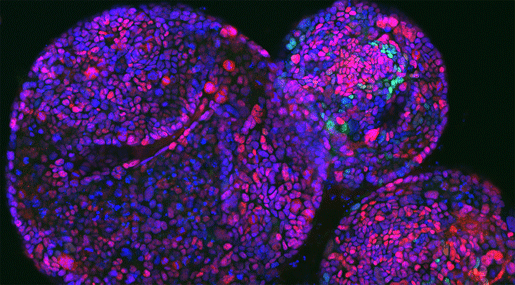
- Belongs to the Research Programs Unit of the Medical Faculty
- Elected for the years 2013-2018
- Composes of the laboratories of 10 distinguished Principal Investigators


Research Infrastructure

Translational Cancer Biology Research Program forms a major user group and actively participates in the development of Meilahti campus research infrastructures whichs include state-of-art animal facilities, genome profiling, proteomics, viral gene transfer, chemical biology, high-throughput screening services, iPSC laboratory, biobanks and translational technologies and many other type of services providing platform technologies for successful translational cancer research. Full list of medical faculty affiliated core services available for TCB researchersis found here and a list of Biocentrum Helsinki affiliated facilities located either on Meilahti or Viikki campuses is found here. The following infrastructures have been established by Principal Investigators of TCB and are currently managed in the premises of the program.
Biomedicum Imaging Unit (BIU)
Biomedicum Imaging Unit was established in 2009 by fusing Molecular Imaging Unit, driven by the Molecular Cancer Biology Program and Cell Imaging Unit, by the Institute of Biomedicine. It represents the largest single-site light microscopy imaging centre in Finland and provides light microscopy and in vivo experimental imaging services to the Meilahti campus. The directors of BIU, Elina Ikonen and Marikki Laiho, were also the founders of Helsinki Functional Imaging Centre (HFIC), one of the 24 recognised national level research infrastructures in Finland. HFIC works to coordinate imaging activities in the Helsinki area, and provides a user friendly interface for the distribution of information on resources, activities, and training. HFIC also brings together the imaging core facilities from the Meilahti, Viikki and Kumpula campuses of the University of Helsinki, and the Nanomicroscopy Center of Aalto University School of Science and Technology. BIU acts as a 100% service and training facility for both basic scientists at the University of Helsinki and clinical investigators at the Helsinki University Central Hospital, as well as scientists from the Folkhälsan Research Center, Minerva Research Institute, Wihuri Research Institute, National Institute for Health and Welfare, and Institute for Molecular Medicine Finland. Instrumentation includes 2 Zeiss and 1 Leica laser scanning confocal microscopes, 2 Caliperls IVIS whole animal imaging systems, a Cellomics high content screening platform, 3 high-speed widefield live-cell epifluorescence imaging systems (Zeiss, Nikon, Olympus-TILL Photonics), some of which have micro-injection and TIRF imaging capabilities, and image processing workstations with dedicated rendering and analysis software. Experimental MRI Unit, that houses a 155 mm-bore 4.7 Tesla small animal fMRI system, was incorporated in 2010. A new infrastructure for CARS and multiphoton imaging platform is currently being established. BIU is also managing the Optical Projection Tomography (OPT) scanner for 3D imaging for whole mount biological specimens, including animal tissues, organ systems, whole embryos, and with cellular resolution.
Biomedicum Functional Genomics Unit (FuGu)
Biomedicum Functional Genomics Unit (FuGU) provides wide range of services to facilitate research groups nationwide to capture modern functional genomics approaches in research. These services cover genome profiling with four different microarray platforms: Affymetrix, Agilent, Illumina and Roche-Nimblegen as well as next-generation sequencing by Illumina GAIIx. The genome profiling services include copy number profiling, transcriptomics analysis for miRNA and exon specific expression, DNA-protein interaction and epigenome analyses, as well as nucleic acid extraction and quality control analysis. Furthermore, the core unit provides in-house computational data analyses (NGS, profiling, network analyses) and separate service platform for virus mediated gene silencing and overexpression. High-titer shRNA and ORF lentiviruses targeting genes of interest are offered for silencing and ectopic expression purposes. Lentiviruses are produced using customer’s vector or in-house lentiviral shRNA vector collection (TRC library) targeting 16,000 human and mouse genes each. The unit also provides consultation and technical help for researchers in Finnish Biocenters, including Meilahti and Viikki campuses. The unit is located in Biomedicum Helsinki. The unit is co-directed by Drs Outi Monni and Juha Klefström. FuGU is located in the shared premises of Genome-Scale Biology and Translational Cancer Biology programs.
Gene Transfer and Cell Therapy Unit
AAV Gene Transfer and Cell Therapy Core Facility has produced recombinant AAVs for internal and external customers and conducted several research lines. Uses are vascular engineering of tissues, reprogramming of somatic cells into induced pluripotent stem cells (iPS), delivery of engineered antibodies to experimental animals and, in future perspectives, to human patients, regulated expression of transgenes in vivo. Therapeutic applications of AAV will require to tightly control the expression of delivered transgenes and gene targeting.
Biomedicum Sequencing Unit (BSU)
The Biomedicum Sequencing Unit core facility provides a sequencing service for DNA templates (plasmid DNA, PCR products). Sequencing reactions are analysed with an Applied Biosystems ABI Prism 3130xl 16 capillary Genetic Analyzer. The unit services around 30 groups on campus, including Biomedicum Helsinki, Haartman Institute and the Helsinki University Central Hospital.
Äkta Explorer FPLC Core Facility
Contacts: Michael Jeltsch and Marko Hyytiäinen.
